From Ann Arbor to Addis Ababa
Zingtrain travels to Africa
In May, ZingTrain had the privilege of being invited to teach in Ethiopia. And we’re not using the word privilege lightly here. Dr. Senait Fisseha is an inspiring and inspired doctor. Among the many roles Dr. Fisseha plays at the University of Michigan is the Executive Director of the Center for International Reproductive Health Training (CIRHT). And it was in that capacity that she asked ZingTrain to be part of the life-changing work she is doing in her native Ethiopia. To quote from a University of Michigan press releases:
“Dr. Fisseha has learned that well-trained OB-GYNs work as leaders in the health system and generate positive public health impacts including increased family planning provision, better pregnancy management, more facility-based deliveries, and better surgical outcomes. Our center will help empower women to make their own decisions about their own reproductive health, thereby choosing whether and when to start a family. Our ultimate goal is to help train future generations of capable and competent health care providers in many parts of Africa and South Asia who can deliver comprehensive reproductive health services, and also be advocates for the safest and best healthcare possible at every stage of a woman’s life. ‘Today, our center begins its new role in the developing world as we work with our partners in Ethiopia to ensure that incoming doctors, midwives and other health professionals are equipped to provide comprehensive reproductive health care that will save women’s lives,’ says Dr. Fisseha.”
Our contribution to Senait’s amazing work was to share our thoughts on Leadership, Change, and Organizational Culture with the visionary and determined healthcare professionals she works with in Africa. It is our hope that we contributed in some small way to their massive and much needed undertaking.
I interviewed Ari and ZingTrain’s Ann Lofgren who traveled to Ethiopia to teach. It was clear to me as we spoke that our conversation could have gone on for days. They were teeming with recognitions and realizations that came from this amazing opportunity. They saw how cultural differences play a role when you are training in a different nation, and came to understand the challenge in translating our values and techniques across that difference. They recognized the role that access to resources play in our success and were humbled by the honor of being able to contribute to such great work. What follows is a distillation of that conversation that could have gone on for days.
_____________________________________________________
Gauri: What were you doing in Ethiopia?
Ari: We were teaching ZingTrain content in collaboration with the Center for International Reproductive Health Training (CIRHT) and the Center of African Leadership Studies (CALS).
We did 3 sessions at St. Paul’s Hospital Millennium Medical College (SPHMMC) and one session for the directors of all the Ethiopian government ministries—from Agriculture to Transport to Health.
On Day 1 we taught Zingerman’s 12 Natural Laws of Business to about 35 members of the St. Paul’s Leadership team. On Day 2 we did 2 sessions on Servant Leadership—one for all the head nurses and the second for members of the hospital administration. What we presented to the directors of the ministries was a mix of the 12 Natural Laws and Servant Leadership.
How were those training topics chosen?
Ari: Well, the answer begins a while ago. Teddy Araya, who founded and runs the Center for African Leadership Studies, came to the U.S. as a part of his work with the University of Michigan. This was about a year and a half ago. He attended my ZingTrain Speaker Series session on Creating Creativity and after the session we got to talking and Teddy said to me, “ One day I will get you to Ethiopia.” And he did.
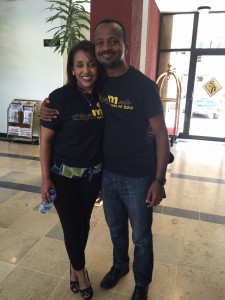
Dr. Senait Fisseha & Teddy Araya
Teddy teaches Leadership and has been working with the cohort at the hospital on Leadership. He is an incredible teacher and trainer—he practically co-taught the session with me. And he’s doing great work with the team at St. Paul’s Hospital. Recognizing that the team he has been working with has not had the opportunity for extensive Leadership training, Teddy wanted to widen the range of Leadership ideas and concepts that they were being exposed to, he wanted to bring in a new perspective. And that’s the role we were playing.
Teddy is very committed to service—both internal service that co-workers give each other and external service to customers. The Ethiopian economy is booming and Teddy believes that for it to keep growing in a meaningful way, the next focus has to be on Service. Being a visionary, he is also very bought into the idea of Visioning and how we apply it to projects of all scales. That’s how Zingerman’s 12 Natural Laws of Business became part of the training we delivered. Because they touch on everything from Visioning to Service to Organizational Change.
Ann: I would reinforce that an important aspect for Teddy was to bring in someone from the outside because people listen and accept differently when they hear a fresh perspective from what they’ve been hearing over the years.
What resonated the most with your audience?
Ann: Going in we were just not sure how our ideas would translate across culture and language. We know that the way we use Visioning here at Zingerman’s is a pretty radical thing, Even when we teach it here in the US, with no cultural or language differences, we present the idea, we talk about how we do it, we set it all up and then we kind of hold our breath and wait.
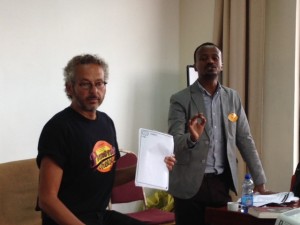
Ari & Teddy Araya
We did the same at St. Paul’s. Ari explained it to them. Teddy translated it into Amharic and helped with some of the cultural differences. And then we held our breath and waited, unsure that it was going to work at all.
But it did! Visioning was definitely what resonated with the group the most.
Yemisratch Abeje is a lovely woman who was in our training session on Day 1. On Day 2 she stood up and said to the team, “Yesterday changed everything.” And then she explained what she meant. She explained Visioning to her team. It was all in Amharic and we couldn’t understand a word she was saying but we all had goosebumps. She was almost crying. We were almost crying.
Ari: That moment really reinforced the statistic that over 90% of what we hear and learn is not the words. It really was pretty great – when we presented Visioning, they said the same things people say here. “It changed my life.” “Nothing will ever be the same again.” “I can’t believe I got this far without it.” “I can use it for anything—even my personal life.”
What resonated the least? What was hard to translate? Where did you have to change how we typically teach something?
Ari: The hardest thing—and it wasn’t that different from teaching in Slovakia—is that the audience all speak English but they understand it better than they speak it. Learning new ideas in a group is awkward anywhere. Learning in a language that is not the language you speak in is more so. And on our end, teaching in a culture that is not our culture is challenging. Metaphors don’t translate well. You’re concerned about being respectful in a culture you don’t understand, even if you studied it. And the humor, the humor doesn’t translate well!
Ann: The way we introduce the Zingerman’s 12 Natural Laws of Business is by talking about the Energy Crisis in the American workplace. The Energy Crisis was a challenging idea to convey. The great thing was that when they got it they totally got it but we had to go about it a different way.
Ari: There’s also this. In any place that has a lot of poverty, the notion of Energy Crises and choosing to do good work is hard to translate because the opportunity for people to create good work for themselves is much smaller. Sheer necessity plays a much bigger role in your choice of work. Our support systems, our opportunities, our advantages here are just so much more significant. And consequently you find a lot of good energy being directed at the infrastructure rather than creating good work.
Ann: I think that despite the lack of resources, despite the language barrier, despite the cultural challenge, what came through to us was their determination.
They truly appreciated the opportunity to be at the training. Because their resources are limited, I sensed that they appreciated the opportunity far more than their American counterparts might have. And that was big. That made what they were hearing even more important and it is clear to me that they are going to do something about it!
Ari: The truth is that they are trying to change the face of healthcare in Ethiopia. Senait is an awe-inspiring person, a testimony to the what one single person can achieve with vision and determination and drive. As I was prepping to teach the Natural Laws, the obvious dawned on me. Senait is a living example of all the Natural Laws. She is living in harmony with all of them. She provides Vision. She does the hard work no one else wants to do. She envisions and values and brings together the contributions of really diverse resources. Under her leadership, they are clearly building a cathedral, not just laying stone. They are changing the quality and focus of healthcare in terms of both content and attitude. They are trying to treat patients with respect and competence.
And that is what we were contributing to.
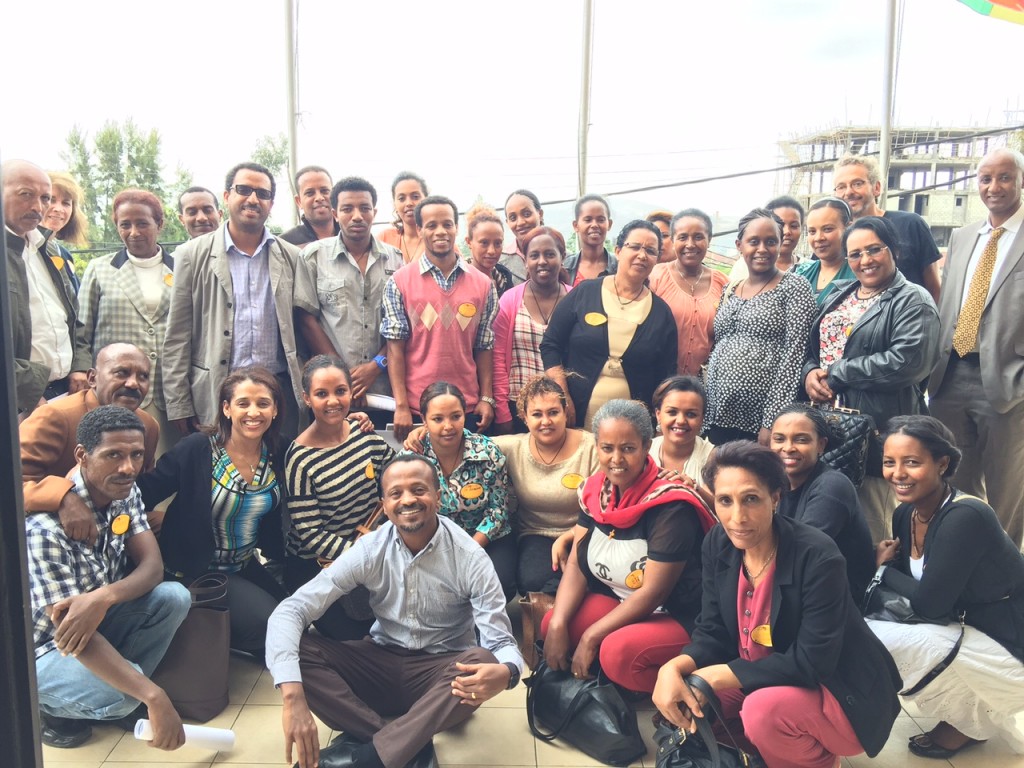


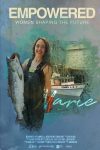
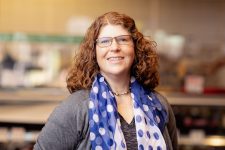
Zingerman’s Art for Sale